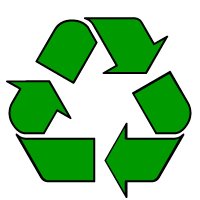
I take in too many newspapers, in order not to be left behind on
something. The result is that I have difficulty getting them all
ready for garbage day. Very little is
real news,
and not much is
original opinion about what news there is; in fact, most
of the "opinions" are very predictable, correlated to whatever
newspaper is printing them. The majority of the paper surface
seems to be advertising, including numerous full-pages sprawls
that are so image-oriented one has to guess what is being sold.
One thing is sure:
it makes foolishness of all the fuss some years back about a
paper shortage, and the accompanying urgings to recycle, or just
to use less. Maybe you understand how this shortage became a surplus,
but I sure don't.
Paper is a commodity, and demand brings supply, which can, I
understand, lead to surplus (unless there's a shortage, right?).
Another commodity is oil, which seems
perpetually threatened with extinction, if you listen to the right
voices. The resulting price fluctuations have the potential to change our
way of life, and to determine whether the U.S. will be the
top dog,
or will it be Russia? Between these two, oil and paper, there
is a drastic difference in that no more oil is being
produced, as it requires many millions of years of geological
activity, while trees for paper are growing all the time, assuming
we don't cut them down all at once.
Surpluses and shortages bring us to the economics of the market
system. This is just as interesting as any topic of the day.
"Free" enterprise apparently includes the freedom to squash
competitors and create a monopoly -- which of course your
competitors were "free" to do as well -- paying off
politicians in the process, if that helps. Whatever it was
all about, the "paper shortage" was interesting, and, I must
say, had some lasting effects. My wife still makes sure all
the toilet paper rolls end up in the right bin.